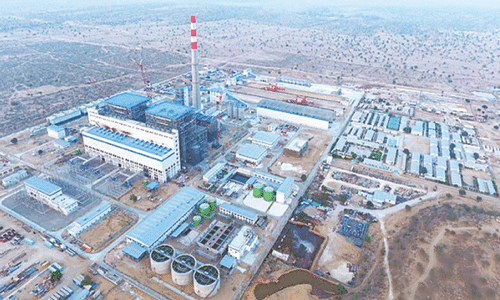DOHA, Nov 10: Pakistan on Saturday called for building a more effective structure for the governance of globalization, progressively and equitably integrating the developing countries into the world economy and focused on advancing development and eradicating hunger and poverty from all parts of the world.
Minister for Commerce and Industries Abdul Razak Dawood in his address at the 4th World Trade Organization (WTO) Ministerial meeting of the organization here said that the current global economic slowdown is not only the result of a cyclical downturn: also manifests the systemic weaknesses of the world economy.
Dawood said the answer to our problems is not so much to launch a new round of trade negotiations, but to build a more effective structure for the governance of globalization.
The minister called for realization of the essential goals including a quick, effective and sustainable solution for the enormous ($2.5 trillion) debt burden of the developing countries, especially low income developing countries.
He emphasised the need for generation of adequate concessional assistance for the poorest countries to address their urgent social, financial and infrastructure deficits and a strategy to channel adequate investment finance towards the developing countries which most need such finance to transform three millions of impoverished peoples into the dynamic consumers and producers of tomorrow; and the creation of an open, equitable and humane global trading system.
Dawood while welcoming the holding of the meeting said that the convening of this meeting transmits to the world an essential message: the fundamental convergence of interests and values in our rapidly integrating world.
“We thank the people and government of Qatar for their generous and traditional hospitality, specially the Emir, who is also the current chairman of the Islamic Summit”.
He maintained that after the atrocities of September 11, the world nations have joined, in a coalition of cooperative security, to oppose terrorism.
This campaign must also bring peace and stability to Afghanistan and bring the relief and reconstruction which the long suffering people of Afghanistan have been denied so far by global indifference and within the new paradigm of cooperative security, underlying the causes of popular anger, conflicts and disputes, poverty and deprivation and inequality - within and among - must be effectively addressed.
He said that Pakistan’s ambitions at Doha are very high and these are not limited to merely launching a “new Round”.
“Development Round” will be an oxymoron, if not a deception, so long as it does not give priority to the development objectives of the developing countries, Pakistan wants to see this Conference conclude with a consensus which initiates the process of creating an open, equitable and humane global trading systems, he remarked.
Towards this end, he said Pakistan advocates that the Doha Ministerial take the following actions:
First, he said we must rectify the inequity of the past. The promised benefits of the form of the Uruguay Round - specially from the textiles and agriculture liberalization - have failed to transpire for most developing countries.
Dawood said “the commitment to ‘progressive liberalization’ of the Agreement on Textiles and Clothing has remained a dead letter. The so-called implementation proposals to rectify the imbalance of the past have been strung out in WTO process for over two years. The package of implementation measure proposed for adoption of Doha is almost a bare cupboard. Some major countries want to take away what little it contains - such as the provision for ‘growth on growth’ in textiles. We would also press for urgent negotiations on the implementation issues which will remain outstanding. These must be addressed and resolved by the end of 2002.”
Second, the minister said “the Doha Meeting must adopt the development agenda - as proposed in Geneva - for priority action under the WTO’s future work programme”.
He added that this development agenda, part from implementation issues, should include the following:
— the removal of tariff peaks and tariff escalations and adoption of the Development Box as central objectives of the agriculture negotiations;
— first priority for meaningful liberalization of the movement of natural persons in the services negotiations;
— focus in the review of the TRIPs Agreement on the “development dimension” and due restraint in dispute settlement action during this review;
— adoption and implementation of the Declaration on TRIPs and public health and a development review of the Agreement’s implication;
— a specific commitment and designated mechanism to operationalize and make legally binding the provisions in WTO Agreement for special and differential treatment of development countries;
— the negotiation of a Framework Agreement on Special and Differential Treatment;
— establishment of Working Groups on Trade and Debt - Finance and on Trade and Transfer of Technology;
Third, the minister said “we should not negotiate additional agreements which can exacerbate the imbalance in the multilateral trading system. The WTO is not the place, certainly not yet, to negotiate international agreements on Investment and Competition Policy. An explicit consensus is required for this. It does not exist at present. The process of studying these issues should continue, perhaps in a more explicit and focused manner, without a decision ab initio to commence negotiations. Likewise, the content of possible rules of behaviour or guidelines in Transparency in Government Procurement and Trade Facilitation need to be clarified prior to any negotiations”.
Fourth, he said “we must not legitimize new protectionism. The Pakistan delegation is deeply concerned at the insertion of a reference to labour standards in the Draft Declaration despite the strong objections of the developing countries. Whatever the disclaimers, we see the underlining motive of such a move as protectionist. We were told that this contentious issue had been buried at the Singapore Ministerial”.
“We are glad that the Chairman of the General Council acknowledged on Friday that the “distance between positions in some key areas remained significant” and that the draft texts of the Ministerial Declaration and the one on TRIMS and public health “did not purport to be agreed in whole or part at this stage”.—APP















































Dear visitor, the comments section is undergoing an overhaul and will return soon.